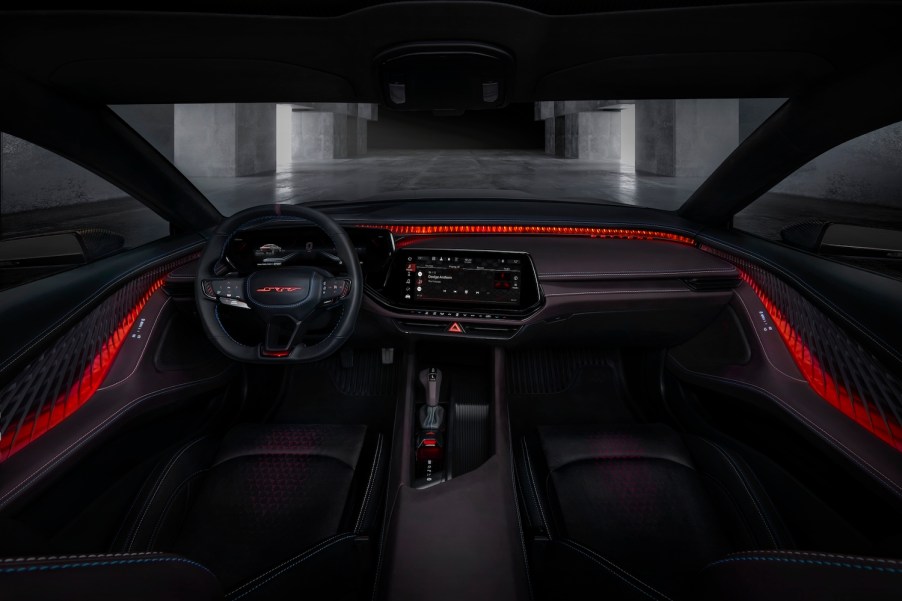
Will You Have To Pay a Reoccurring Fee To Unlock Horsepower?
The long lifespan of electric cars threatens to cut into the auto industry‘s profits. Several companies are tackling this problem by charging a reoccurring subscription fee for features of a vehicle you already own. I expect its only a matter of time before a manufacturer tries to charge you a monthly fee to unlock your vehicle’s full horsepower.
Upgrading your electric Dodge Daytona’s horsepower will cost you

RELATED: Is the Dodge Charger EV’s ‘Fratzonic Chambered Exhaust System’ Just a Speaker Making Engine Noises?
We finally got a glimpse of Dodge’s all-electric replacement for the V8-powered Charger. Its called the Dodge Charger Daytona. Its SRT variant will feature an 800-volt powertrain and be badged as the Banshee. Standard trims will come with either a 340 kW or 440 kW powertrain.
Dodge also revealed that each Charger Daytona will arrive only making a fraction of the horsepower it’s capable of. To unlock your Charger Daytona’s full potential you’ll have to return to the dealership and purchase a “Crystal” key that you can insert in your dashboard. For example, a stock 340 kW Charger Daytona will offer 455 horsepower. But purchasing an upgrade key could unlock 495 or even 535 horsepower–depending on how much you shell out.
I’m not thrilled about Dodge charging buyers extra to unlock their car’s full potential. But it could be much worse. Dodge has said you get to keep this key, and the speed software it unlocks, for the vehicle’s entire lifetime.
Some other automaker could jump on this trend and also charge a subscription fee for horsepower. And with the way the industry’s moving, I expect it will only be a matter of time before someone does this.
Traditional automakers are scared of the future

Detroit’s Big Three and other traditional automakers are wary of electrification. Researching and developing an EV, then retooling factories to mass produce it present many challenges. But none of these are insurmountable. The true danger to Detroit lies in how we will have to finance electric cars.
Electric vehicles require much less maintenance than traditional internal combustion vehicles. Simply put, they have thousands fewer moving parts. The parts that do move, like the electric motors/generators that drive their wheels, last longer than their internal combustion counterparts and don’t need routine maintenance such as oil changes. Regenerative braking even promises to save wear on standard brakes.
Future EVs could potentially last for hundreds of thousands of miles longer than even the sturdiest internal combustion cars. This is because the only major service they’ll require are occasional battery replacements. This won’t be a small task, but will probably be cheaper than continually rebuilding internal combustion engines and transmissions.
The durability and low maintenance characteristics of EVs have automakers and dealerships nervous. This is one of the reasons shareholders are jumping ship, and driving the value of EV startups such as Tesla through the roof. According to MOPAR Insiders, Dodge is requiring you buy Charger Daytona upgrades from your dealership to alleviate dealers’ concerns about how little maintenance EVs will need.
Some automakers see subscription fees as a solution

General Motors just rolled out a “Utilify” software ecosystem for its future vehicles. Tellingly, it did not brag about the system to customers first, but presented it to its shareholders instead. GM announced that future cars would be a “technology platform” leveraging the time drivers must spend behind the wheel to sell them subscription-based apps, many developed by third-parties.
Mercedes-Benz went one step further with its new EQS electric sedan. The Mercedes EQS will come with the equipment to turn its rear wheels, dramatically reducing its turning radius at low speeds. In some countries, you will have to pay a subscription fee to activate the steering rear wheels. In other markets, they will only turn 4.5 degrees, but not their full 10 degrees, until you pay up. That’s right, Mercedes is locking its full turning radius–arguably a safety feature–behind a paywall.
Will Dodge ever charge a subscription fee to unlock the full horsepower of an eMuscle car? Honestly, this is the direction the industry is moving. Only time will tell which automaker gets desperate enough to lock performance behind a paywall first. When this happens, drivers’ only recourse against such a blatantly capitalist choice will be to boycott said automaker until it changes its tune.
Next, read the potential downsides of self-driving cars or watch the Charger Daytona EV reveal yourself in the video below:
RELATED: Rivian, General Motors Get Greedy, Sell Customers Out to Shareholders With Software Subscriptions



